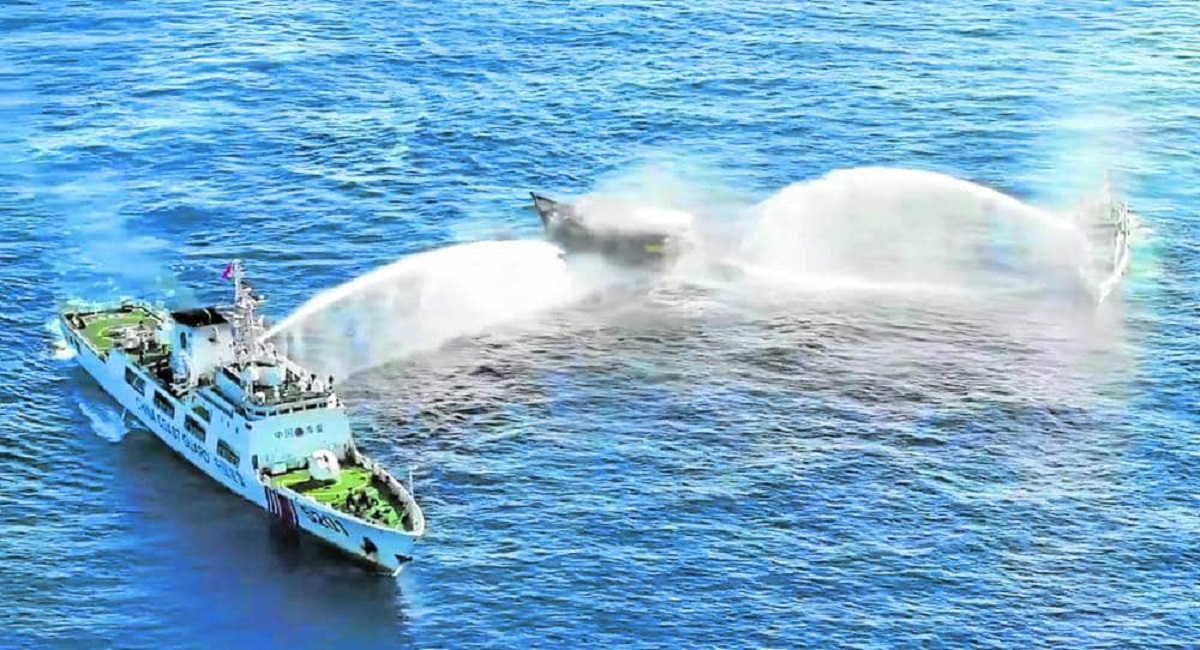DFA open to Ayungin deal extension over entire WPS

CHINA’S AGGRESSION A Philippine Navy boat is flanked by a China Coast Guard vessel (left) and a Chinese maritime militia vessel (not seen in photo) as both ships fire water cannons at the boat during its resupply mission to Ayungin (Second Thomas) Shoal early in March. —video grab from Philippine Coast Guard
MANILA, Philippines — The Department of Foreign Affairs (DFA) is open to the possibility of extending the Philippines’ provisional arrangement with China over Ayungin (Second Thomas) Shoal to the entire West Philippine Sea (WPS).
At Tuesday’s budget hearing by the House committee on appropriations, Foreign Secretary Enrique Manalo, replying to a question raised by House Deputy Minority Leader and ACT Teachers party list Rep. France Castro, said that the coverage extension was “certainly an interesting idea,” if Beijing and other claimants to the disputed areas of the South China Sea were willing to cooperate.
READ: PH-China agreement reached on Ayungin
According to Ma. Theresa Lazaro, DFA undersecretary for bilateral relations and Asean affairs, the provisional understanding with China on the rotation and reprovisioning (Rore) of troops at Ayungin Shoal is a bilateral consultative mechanism.
The two countries came to an arrangement last month after multiple standoffs at Ayungin, where the Philippines in 1999 grounded a navy vessel and maintained a small number of troops on it to prop up its maritime claims.
The arrangement only covers resupply missions in Ayungin Shoal and not the other disputed features in the South China Sea.
“The salient points of the provisional arrangement are basically, [first], this is without prejudice to our national positions… Second, this will be subject to review,” Lazaro said.
Manalo pointed out that since the understanding was provisional, it could be subject to improvement.
Diplomatic protest
Manalo also said that they met on Monday with officials of the Chinese Embassy in Manila to discuss the Aug. 8 incident where China’s fighter jets fired flares in the path of a Philippine Air Force (PAF) plane conducting a routine patrol over Bajo de Masinloc (Panatag or Scarborough Shoal).
“We have what we call a bilateral consultation mechanism in the [WPS] or South China Sea with China and that meets regularly every few months. Any incident that happens in WPS which we feel is detrimental to our interests caused by China, we, of course, will raise it,” he pointed out.
He said the note verbale the DFA sent to China indicated a strong condemnation of the incident and that the PAF plane posed no threat as it was just conducting lawful flight operations over Philippine airspace.
He explained that the Philippine policy on the WPS “has always been our willingness to settle any differences or disputes through peaceful means.”
But De La Salle University international studies lecturer Don McLain Gill told the Inquirer on Tuesday that China’s recent action was meant to show that the agreement would not dampen Beijing’s claim.
“By belligerently engaging in our airspace, China is fast exacerbating conditions in the air front. Therefore, just as we seek to keep our seas open, we must keep our airspace open [and safe] from China’s monopolizing tendencies,” Gill said.
“More robust joint navy and air force exercises with our partners should be considered. We must also consider utilizing funding toward our air power assets and air defense systems,” he added.
Expansionist move
The dropping of flares is the latest in a series of aggressive tactics China has been using this year to press its sweeping claims over the South China Sea.
Retired Supreme Court Associate Justice Antonio Carpio told the Inquirer on Tuesday that filing another international case against China’s expansionist claims and harassment tactics could be the next step in dealing with the maritime conflict.
“The flares incident only proves that China is determined to seize everything within the 10-dash line no matter what. Let us just proceed to file another arbitration case against China, a move that they obviously dread because another arbitral award will draw more support from other countries and drive another nail on the 10-dash line coffin,” Carpio said.
The latest Ayungin incident was denounced by the Armed Forces of the Philippines on Tuesday as “unprofessional” and “unsafe.”
It was “coercive, aggressive and deceptive,” according to Rear Adm. Roy Vincent Trinidad, Philippine Navy spokesperson for the WPS. —with reports from Jacob Lazaro and Nestor Corrales
For comprehensive coverage, in-depth analysis, visit our special page for West Philippine Sea updates. Stay informed with articles, videos, and expert opinions.


















